•••• Retour programme 2012 / Back festival line-up here ••••
Samedi/Saturday 10 Nov • Dimanche/Sunday 11 nov • Lundi/Monday 12 nov • Mardi/Tuesday 13 nov • Mercredi/Wednesday 14 nov • Jeudi/Thursday 15 nov • Vendredi/Friday 16 nov
• De 14h00 à 17h00 •
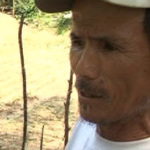 Le Musée de Thien
Le Musée de Thien
Thien’s Museum
Vietnam | 2011 | 29 min | vostf
un film de / directed by : HOANG Tùng (Vietnam)
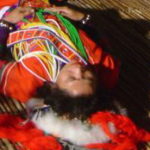 Returning Souls
Returning Souls
Le Retour des âmes
Taiwan | 2012 | 85 min | vosta
un film de / directed by : HU Tai-Li (Taiwan)
• De 17h30 à 19h30 •
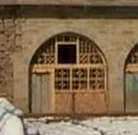 Yaodong, petit traité de construction
Yaodong, petit traité de construction
Yaodong, A Short Treatise on Construction
Chine | 2012 | 89 min | vostf
un film de / directed by : Elodie Brosseau (France)
• De 20h30 à 23h00 •
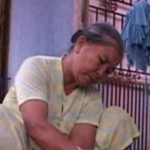 La Natte de Madame Bua
La Natte de Madame Bua
Mrs Bua’s Mat
Vietnam | 2011 | 35 min | vostf
un film de / directed by : DUONG MONG Thu (Vietnam)
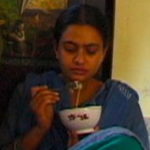 Kokkho-Poth
Kokkho-Poth
Échos des chambres d’autrefois (The Sound Of Old Rooms)
Inde | 2011 | 74 min | vosta
un film de / directed by : Sandeep Ray (Inde)
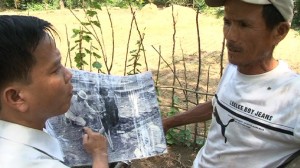 Le Musée de Thien / Thien’s Museum
Le Musée de Thien / Thien’s Museum
Vietnam | 2011 | 29 min | vostf
un film de / directed by : HOANG Tùng (Vietnam)
image / photography : HOANG Tùng
montage / editing : PHAM Thi Hao
son / sound : MINH Sơn production/distribution : Ateliers Varan (Paris, France) – communication(at)ateliersvaran.com
EN PRÉSENCE D’ANDRÉ VAN IN, CINÉASTE, CO-RESPONSABLE DE L’ATELIER VARAN VIÊT NAM / WITH THE PRESENCE OF FILMMAKER ANDRÉ VAN IN, CO-HEAD OF ATELIER VARAN VIÊT NAM.
Thien, jeune historien, travaille pour le Musée de la guerre de Da Nang, ville située sur le 17ème parallèle. Il mène des recherches dans la région auprès des survivants, paysans, résistants, et rassemble les histoires, photos, archives et objets, témoignages de leur vie quotidienne pendant cette période. Né après la guerre, Thien découvre la réalité de cette page d’histoire. Manifeste contre la guerre et plaidoyer pour la paix, son travail contribue à préserver la mémoire.
Thien serves as a historian for the War Museum of Da Nang and carries out research in the area, among survivors, peasants and resistance fighters. He collects all the traces of daily life dating back from that time: stories, photographs, archives and objects. Born after the war, Thien discovers the reality of those facets of history. In an anti-war spirit, his work speaks for peace, contributing to preserve collective memory.
__________
Hoang Tung est âgé de 35 ans, il est caméraman à la télévision publique vietnamienne à Da Nang (VTV). Il participe aux ateliers Varan depuis 2010, année où il réalise son premier film Jeunesse !
__________
haut de page / top of the page
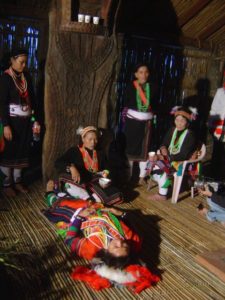 Returning Souls Le Retour des âmes
Returning Souls Le Retour des âmes
Taiwan | 2012 | 85 min | vosta
un film de / directed by : HU Tai-Li (Taiwan)
image / photography : LI Chung-Wang
montage / editing : HU Tai-Li and WU Shu-Ting
son / sound : HU Tai-Li and CHANG Wei-fan
Production/distribution : HU Tai-Li, Institute of Ethnology (Taipei, Taiwan) – taili(at)gate.sinica.edu.tw
EN PRÉSENCE DE LA RÉALISATRICE / FOLLOWED BY A DISCUSSION WITH THE FILMMAKER
En 2003, de jeunes Amis – groupe aborigène de Taiwan – contactent le musée de l’Institut d’Ethnologie de Taipei, où sont conservés, depuis la destruction de leur sanctuaire en 1958 par un typhon, les panneaux sculptés qui racontent leurs mythes d’origine. Un processus de collaboration se met en place entre le musée et les Amis pour la préservation et la revitalisation de ce patrimoine culturel. Une fois que les chamans ont réussi à communiquer avec les ancêtres des panneaux, leurs âmes peuvent revenir au village. De nouveaux panneaux sont alors sculptés tandis que le sanctuaire est reconstruit. L’histoire de ce « rapatriement » original et de sa complexité, dans un film qui entremêle réalité et légendes.
In the historically most famous ancestral house of the matrilineal Amis tribe in Taiwan, the carved pillars tell legends, such as the great flood and the father-killing headhunting event. After a strong typhoon toppled the house, the pillars were moved to the Institute of Ethnology Museum. Recently, young villagers, with assistance from female shamans, pushed the descendants and village representatives to communicate with ancestors in the pillars. They eventually brought the ancestral souls back and began reconstructing the house. This documentary interweaves reality and legends as well as the seen and the unseen as it records the unique case of repatriation, and sketches out the complex issues related to the managing of a cultural preservation project.
site officiel / official website : http://returningsouls.pixnet.net/blog
__________
Pionnière du cinéma ethnographique à Taiwan, HU Tai-Li est actuellement chercheur à l’Institut d’ethnologie de l’Academia Sinica de Taïwan et présidente du Festival international du film ethnographique de Taïwan. Diplômée du Département d’histoire de l’Université nationale de Taiwan, elle poursuivit ses études à la City University de New York et obtient un doctorat d’anthropologie. Elle a réalisé de nombreux films, souvent primés dans les festivals internationaux : The Return of Gods and Ancestors, Songs of Pasta’ay (1989), Voices of Orchid Island (1994), Passing Through My Mother-in-law’s Village (1998), Sounds of Love and Sorrow (2000), Encountering Jean Rouch (2003), Stone Dream (2004) After Passing (2006).
__________
haut de page / top of the page
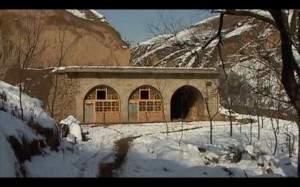 Yaodong, petit traité de construction / Yaodong, A Short Treatise on Construction
Yaodong, petit traité de construction / Yaodong, A Short Treatise on Construction
Chine | 2012 | 89 min | vostf
un film de / directed by : Elodie Brosseau (France)
anthropologue / anthropologist : Caroline Bodolec
Image et son / photography and sound : Elodie Brosseau
montage / editing : Hélène Attali
production/distribution : Ecole des Hautes Etudes en Sciences Sociales (EHESS) (Paris, France) – Caroline.Bodolec(at)ehess.fr
EN PRÉSENCE DE / FOLLOWED BY A DISCUSSION WITH CAROLINE BODOLEC (ANTHROPOLOGUE), ELODIE BROSSEAU (CINÉASTE), HELÈNE ATTALI (CHEF-MONTEUSE)
C’est dans la région du Shaanbei, dans la boucle du fleuve Jaune, que se construisent les yaodong. Ces habitations en voûte, à l’origine troglodytes et désormais adossées à la montagne, sont construites sans plan d’architecte, selon un savoir-faire transmis oralement. Les étapes de la construction suivent le travail très précis des maîtres tailleurs de pierre, des maîtres menuisiers, des maîtres de Fengshui et des manœuvres, tous vivant dans des yaodong avec leurs familles. Une rencontre avec ces habitants, leurs rituels, leur histoire… qui fait peu à peu émerger un instantané de la « culture yaodong » d’aujourd’hui.
In the region of Shaanbei, within the Yellow River loop, are built the Yaodong. Formerly troglodyte settlements these vault houses are now built against the mountain. Yaodong are built without architect’s plan, following a knowledge handed down orally. The film shows us the highly accurate work of master stonemasons, as well as master carpenters, master of Fengshui and workers, all of them living in Yaodong with their families. As the filmmaker takes us to meet these people, their rituals and their history, a snapshot of today’s « Yaodong culture » emerges gradually.
_________
Élodie Brosseau née en 1971 à Paris est diplômée d’une maîtrise de Langue et Civilisation chinoises (INALCO, 1997). À partir de 1993, elle enseigne et travaille parallèlement en réalisation et production, en France et en Chine, pour la radio, la télévision et le cinéma. En 2007-08, elle collabore au Commissariat d’une exposition à la Cité de l’architecture et du patrimoine à Paris, intitulée « Dans la ville chinoise ». Elle suit en 2008 une formation en réalisation documentaire aux Ateliers Varan. Yadong, Petit traité de construction est son premier long-métrage documentaire.
__________
retour au sommaire du mercredi 14 novembre
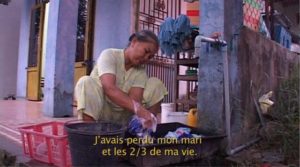 La Natte de Madame
La Natte de Madame
Bua Mrs Bua’s Mat
Vietnam | 2011 | 35 min | vostf
un film de / directed by : DUONG MONG Thu (Vietnam)
image / photography : DUONG MONG Thu
montage / editing : PHAM Thi Hao
son / sound : PHAM Thi Hong Lien,
NGUYEN Thi Thu Hong, HOANG Khanh Linh
production/distribution : Ateliers Varan (Paris, France) – communication(at)ateliersvaran.com
EN PRÉSENCE D’ANDRÉ VAN IN, CINÉASTE, CO-RESPONSABLE DE L’ATELIER VARAN VIÊT NAM / WITH THE PRESENCE OF FILMMAKER ANDRÉ VAN IN, CO-HEAD OF ATELIER VARAN VIÊT NAM.
Depuis qu’elle a été torturée pendant la guerre, Madame Bua souffre d’épilepsie. Quand elle sent venir une crise, elle étend sa natte devant sa maison et se couche. C’est un signe pour ses voisins, qui prennent alors soin d’elle. Le soir, tous se réunissent pour boire du thé, chanter les chants de la résistance et raconter des histoires, qui constituent aujourd’hui leur mémoire collective. La guerre reste au cœur de la vie quotidienne de ce village.
Ever since she was tortured during the war, Mrs Bua suffers from epilepsy. When she feels a fit coming, she spreads a carpet in front of her house and lies down. For her neighbors, it’s like a cue to drop in and care for her. In the evenings, they gather to sip tea, sing resistance movement songs and tell stories, now deeply ingrained in their collective memory. The war remains at the heart of this small village’s daily life.
__________
Née en 1977, DUONG MONG Thu est diplômée en linguistique et travaille, depuis 2000, comme journaliste et rédactrice en chef à la télévision publique vietnamienne de Da Nang (VTV). Elle participe aux ateliers Varan Vietnam de Da Nang et réalise, dans ce cadre, le film Le bandeloriste en 2010.
__________
haut de page / top of the page
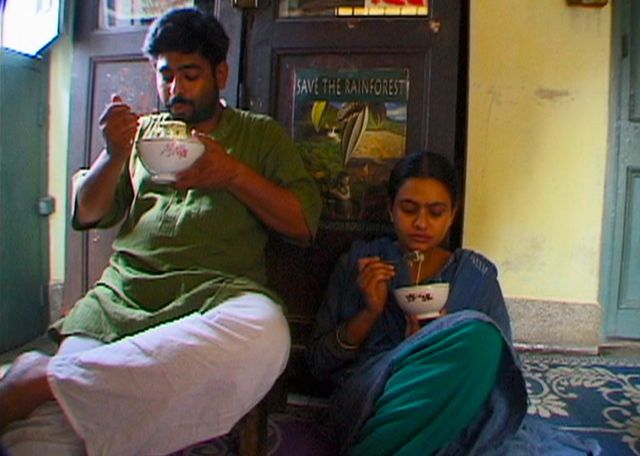 Kokkho-Poth / Échos des chambres d’autrefois (The Sound Of Old Rooms)
Kokkho-Poth / Échos des chambres d’autrefois (The Sound Of Old Rooms)
Inde | 2011 | 74 min | vosta
un film de / directed by : Sandeep Ray (Inde)
image / photography : Sandeep Ray
montage / editing : Sandeep Ray, Subhadro Chowdhury
production/distribution : Sandeep Ray, Ray Pictures (Kolkata, Inde) – ray.sandeep(at)gmail.com
EN PRÉSENCE DU RÉALISATEUR / FOLLOWED BY A DISCUSSION WITH THE FILMMAKER
Tourné à Calcutta entre 1991 et 2011, ce documentaire qui combine cinéma-vérité et néoréalisme, nous fait partager la vie de Sarthak, un indien ordinaire qui tente d’être fidèle à sa vocation de poète tout en jonglant avec une vie de famille traditionnelle. Le film dresse le portrait d’une famille indienne à l’entrée du nouveau millénaire : sa mère, son épouse, un agent littéraire excentrique, des amis proches, des collègues écrivains, des étudiants et enseignants. Nous suivons Sarthak alors qu’il parcourt Calcutta, qu’il essaie de comprendre la vie et de trouver un sens à son travail.
Filmed entirely in Calcutta in a combination of cinema-verite and neorealist styles from 1991-2011, this up-close documentary takes the viewer through the life experiences of Sarthak, an ordinary Indian man trying to hold on to his calling of being a poet while juggling a regular family. The film is also a portrait of a sprawling Indian family entering the new millennium. Numerous characters – his mother, wife, eccentric literary agent, close friends, fellow writers, students and teachers add to the fabric of this story. Sarthak takes us through the underbelly of Calcutta as he tries to understand life and find meaning in his work.
site officiel / official website : http://www.sandeepray.com/